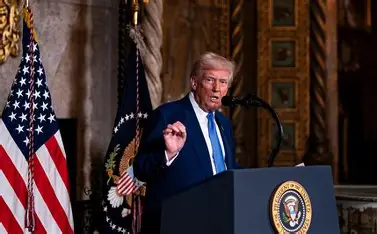WASHINGTON — Former President Donald Trump is intensifying his call for greater executive control over independent federal agencies, including the Federal Communications Commission (FCC), arguing that such oversight is essential to advancing his political agenda and safeguarding what he describes as “American interests in technology and media.” Trump made these remarks during a recent rally, reiterating a long-standing position that the structure of independent agencies needs reform.
Trump’s comments come amid ongoing debates over the power and independence of agencies such as the FCC, the Federal Trade Commission (FTC), and the Securities and Exchange Commission (SEC). These bodies regulate key sectors including communications, trade, finance, and technology, wielding significant influence over issues ranging from broadband policy to content moderation and corporate mergers. Trump’s push for control reflects a broader effort to reshape U.S. governance and reassert presidential authority over regulatory bodies.
At the rally, Trump argued that independent agencies have become overly politicized and unaccountable to the American people. “We need to take control of these agencies so they work for the people, not for bureaucrats or special interests,” Trump said. He specifically cited the FCC as a prime example, pointing to recent regulatory decisions on internet content, media ownership, and 5G rollout as areas where he believes greater presidential oversight is needed.
Experts say Trump’s proposal would represent a significant shift in the balance of power between the executive branch and independent agencies. Traditionally, agencies such as the FCC operate with a degree of autonomy to insulate decisions from political interference. Changing this structure could have broad implications for policy-making, media regulation, and the balance of democratic oversight.
Supporters of Trump’s position argue that placing agencies under direct presidential control could lead to more efficient decision-making and clearer accountability. Critics, however, warn that such a move risks undermining the impartiality and independence of regulatory bodies, potentially opening the door to partisan influence over critical policy areas.
The FCC, in particular, plays a central role in shaping the nation’s communications landscape, overseeing everything from broadband access to net neutrality rules. Trump’s interest in controlling the agency reflects his broader strategy to influence the future of digital policy, media regulation, and technology governance.
Trump has tied this proposal to his larger political platform, which emphasizes deregulation, economic growth, and the expansion of American technological leadership. His push for control of agencies like the FCC is also linked to his broader battle with social media companies and concerns over censorship, which have been central themes in his political rhetoric.
While Trump does not currently hold the presidency, his influence over the Republican Party and his strong base of supporters mean that his calls for agency reform could have significant political traction. As debates intensify, control of regulatory agencies is likely to emerge as a key issue in upcoming political campaigns and congressional hearings.



